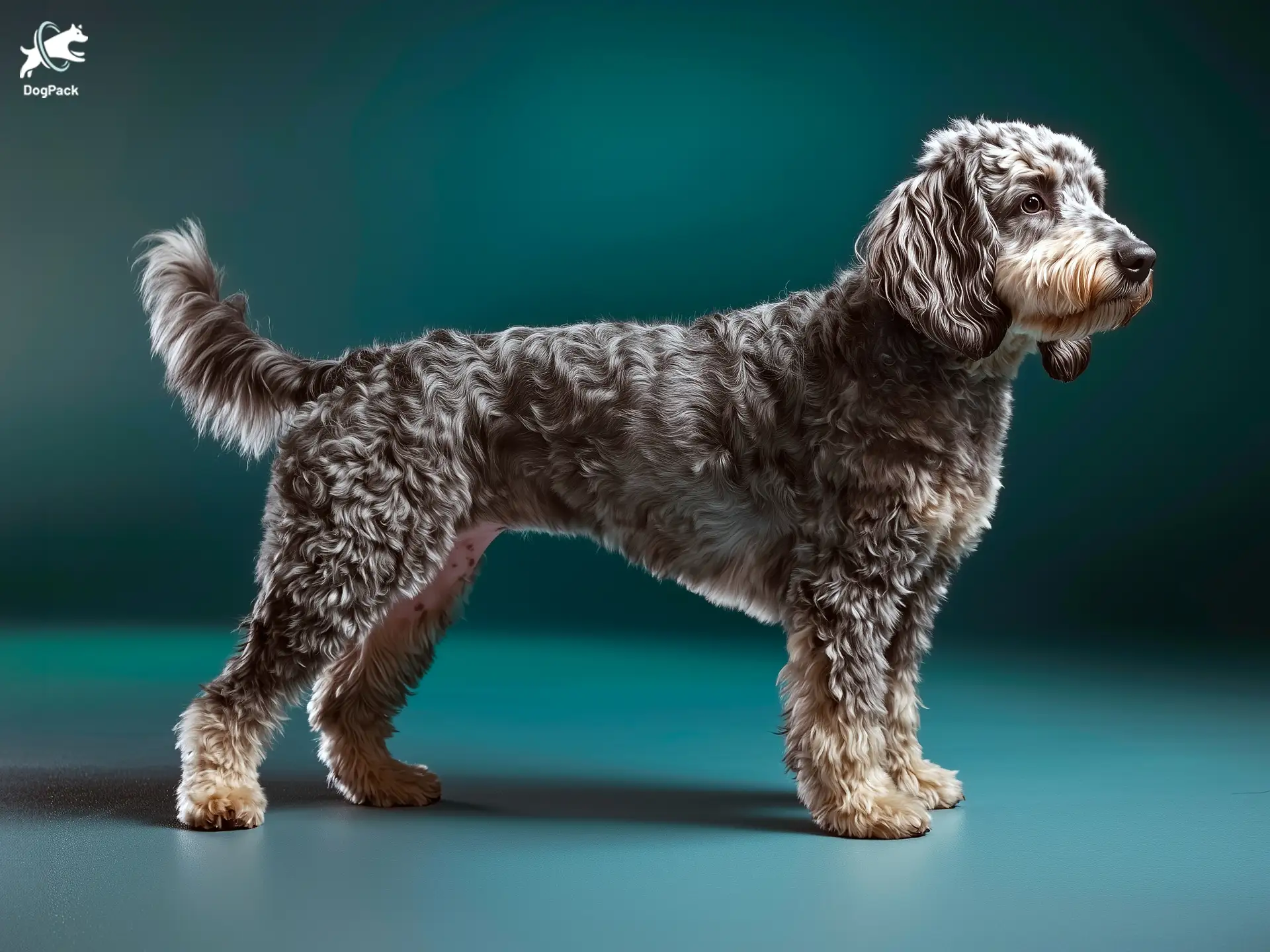Aussiedoodle Dog Breed Info & Overview
The Aussiedoodle is a delightful blend of the Australian Shepherd’s energy and the Poodle’s intelligence. This charming hybrid is known for its playful nature, curly coat, and vibrant personality. With a love for adventure and strong loyalty to its family, the Aussiedoodle thrives in active households. Whether you’re looking for a quick learner or a fun-loving companion, this breed brings endless affection and joy to any home. If you want a dog full of life, the Aussiedoodle may be the perfect fit.
Characteristics
Pictures
Breed History
While the Aussiedoodle is a relatively new breed, its popularity has soared in recent years. Originating in the United States, breeders aimed to combine the intelligence and hypoallergenic coat of the Poodle with the herding instincts and energy of the Australian Shepherd. The result? A versatile and affectionate companion perfect for active households.
The Australian Shepherd, despite its name, was developed in the U.S. as a hardworking ranch dog. Pairing it with the Poodle, known for its intelligence and low-shedding coat, created a designer breed that excels in agility, obedience, and as a loving family pet. The Aussiedoodle inherits the best traits from both parents.
Though not recognized by major kennel clubs, the Aussiedoodle has carved out its own niche among dog enthusiasts. Their rise in popularity is attributed to their trainability and compatibility with families. As more people seek dogs that are both intelligent and hypoallergenic, the Aussiedoodle stands out as an ideal choice.
Temperament, Personality
Aussiedoodles are renowned for their friendly and outgoing personalities. They thrive on human interaction and are often eager to please, making them highly trainable. Their intelligence means they pick up new commands quickly, but it also means they need mental stimulation to prevent boredom.
These dogs are affectionate and form strong bonds with their families. Aussiedoodles typically get along well with children, making them excellent family pets. However, their herding instincts may lead them to try and herd smaller children or animals, so early training and socialization are important.
With strangers, Aussiedoodles are generally friendly but may be a bit reserved initially. They are not typically aggressive but will alert their owners to unfamiliar sounds or visitors. Their playful nature means they enjoy interacting with other dogs, especially when properly socialized from a young age.
Physical Characteristics
Aussiedoodles are medium-sized dogs with a sturdy build. Their appearance can vary widely, but they often inherit the curly or wavy coat of the Poodle, combined with the striking colors of the Australian Shepherd. Coats can range from solid colors to merle patterns, adding to their unique charm.
One of the most notable features of the Aussiedoodle is their expressive eyes, which can be brown, blue, or even one of each. Their ears are typically floppy, and they have a well-proportioned body that reflects their active lifestyle. Their tails may be long and feathered or docked, depending on breeding.
Size can vary depending on the Poodle parent, with standard Aussiedoodles standing between 20 to 22 inches tall and weighing 40 to 70 pounds. Miniature versions exist, resulting from breeding with a Miniature Poodle, offering a smaller option for those with limited space.
Health Issues
Like all breeds, Aussiedoodles can be prone to certain health issues. Common concerns include hip dysplasia, a condition where the hip joint doesn’t fit together perfectly, leading to arthritis or lameness. Regular vet check-ups can help detect and manage this condition early.
Eye problems such as progressive retinal atrophy (PRA) are also seen in Aussiedoodles. PRA can lead to vision loss over time. Ensuring that breeding dogs have been screened for genetic eye diseases can reduce the risk. Epilepsy is another condition that may occur, requiring medical management.
Skin allergies can affect Aussiedoodles, often due to environmental factors or food sensitivities. Regular grooming and a balanced diet can help minimize skin issues. Overall, maintaining a healthy lifestyle and regular veterinary care will contribute to a happy, healthy Aussiedoodle. For more information on hip dysplasia, consult the American College of Veterinary Surgeons.
Grooming Needs
Thanks to their Poodle heritage, Aussiedoodles often have low-shedding, hypoallergenic coats. However, this doesn’t mean they’re low maintenance. Their curly or wavy fur requires regular brushing to prevent matting and tangles. A thorough brushing two to three times a week is recommended.
Professional grooming every 6 to 8 weeks can help keep your Aussiedoodle’s coat in top condition. This may include trimming the fur to a manageable length, cleaning the ears, and clipping the nails. Regular grooming sessions also provide an opportunity to check for skin issues or parasites.
Don’t forget dental hygiene! Aussiedoodles benefit from regular teeth brushing to prevent tartar build-up and dental diseases. Bathing should be done as needed, typically once a month, using dog-friendly shampoos that won’t dry out their skin.
Exercise Requirements
Aussiedoodles are high-energy dogs that require ample exercise to stay happy and healthy. Daily walks, combined with playtime in a secure area, will help burn off their abundant energy. Aim for at least 1 to 2 hours of physical activity each day.
These intelligent dogs also need mental stimulation. Activities like agility training, fetch, or puzzle toys can keep their minds sharp. Aussiedoodles excel in canine sports and enjoy tasks that challenge them both mentally and physically.
Without sufficient exercise, Aussiedoodles may develop behavioral issues like excessive barking or destructive chewing. They thrive in homes where they can be active participants in family activities. If you’re an outdoor enthusiast, the Aussiedoodle could be your ideal companion.
Training Tips
Training an Aussiedoodle can be a rewarding experience due to their intelligence and eagerness to please. Positive reinforcement methods work best, using treats and praise to encourage good behavior. Consistency is key to reinforcing commands and expectations.
Early socialization is important to expose your Aussiedoodle to different people, places, and animals. This helps prevent shyness or overprotectiveness. Puppy classes can provide structured learning and social opportunities that benefit your dog long-term.
Be mindful of their sensitive nature; harsh training methods can lead to fear or anxiety. Aussiedoodles respond well to interactive training sessions that challenge them mentally. Incorporating fun games into training can keep them engaged and excited to learn.
Nutrition, Diet
A balanced diet is essential for the active Aussiedoodle. High-quality dog food formulated for medium-sized breeds with high energy levels is recommended. Protein-rich diets support muscle development, while healthy fats provide energy and support coat health.
Portion control is important to prevent obesity, which can exacerbate health issues like hip dysplasia. An adult Aussiedoodle typically requires between 2.5 to 3 cups of dry food per day, divided into two meals. Adjust amounts based on activity level and age.
Consult your veterinarian to tailor a diet plan specific to your Aussiedoodle’s needs. Some may have food sensitivities, so monitoring for allergic reactions is important. Fresh water should always be available to keep your dog hydrated, especially after exercise.
Adoption, Breeders
If you’re considering adding an Aussiedoodle to your family, research is key. Look for reputable breeders who prioritize health and temperament over appearance. They should provide health clearances for both parent breeds and allow you to meet the puppies’ parents.
Adoption is a wonderful option as well. Check local shelters or rescue groups specializing in Aussiedoodles or Poodle mixes. Facebook groups like Aussiedoodle Rescue can help you find a dog in need of a loving home.
Beware of puppy mills or online scams offering Aussiedoodles at unusually low prices. Responsible breeders and rescue organizations will ask questions to ensure their dogs are going to suitable homes. Taking the time to find the right source will lead to a happier experience.
Family Pet?
Aussiedoodles make excellent family pets due to their affectionate and playful nature. They enjoy being part of family activities and are known to be gentle with children. Their energetic disposition means they can keep up with active kids and enjoy interactive play.
However, their high energy levels require families to provide ample exercise and mental stimulation. Aussiedoodles may not be the best fit for households that are frequently away or unable to meet their activity needs. They thrive in environments where they receive plenty of attention.
With other pets, Aussiedoodles generally get along well, especially when socialized early. Their friendly demeanor makes them good companions for other dogs. Introducing them properly to cats and smaller animals is important, considering their herding instincts.
Right For You?
Considering an Aussiedoodle? If you’re looking for an intelligent, energetic, and affectionate companion, this breed might be a great match. They require active owners who can dedicate time to exercise, training, and social interaction.
Apartment living can be challenging for an Aussiedoodle unless their exercise needs are met consistently. They are best suited for homes with yards or owners who are committed to daily outdoor activities. Their grooming needs also require commitment.
Ultimately, the Aussiedoodle is ideal for those seeking a lively and loving addition to their family. If you’re prepared to invest time and energy, you’ll be rewarded with a loyal friend who brings joy and excitement to your life.
Conclusion
Combining the best traits of the Australian Shepherd and the Poodle, the Aussiedoodle is a delightful companion for those ready to embrace their energetic and intelligent nature. They thrive in active households where they can participate in family activities and receive plenty of mental stimulation. While they require commitment in terms of exercise and grooming, the rewards are plentiful. An Aussiedoodle offers unwavering loyalty, affection, and a zest for life that’s truly contagious. If you’re ready for a dog that keeps you on your toes and fills your days with joy, the Aussiedoodle might just be the perfect fit.
FAQs
-
Are Aussiedoodles good with cats?
Aussiedoodles can get along with cats if introduced properly and socialized from a young age. Their herding instincts might cause them to chase, so supervision and gradual introductions are important to foster a peaceful relationship.
-
How much do Aussiedoodles cost?
The price of an Aussiedoodle can vary widely based on breeder reputation, location, and lineage, typically ranging from $1,000 to $2,500. Adoption fees are generally lower. Always ensure you’re dealing with a reputable source to get a healthy dog.
-
Do Aussiedoodles bark a lot?
Aussiedoodles are not known to be excessive barkers, but they may vocalize to alert their owners of strangers or when they need attention. Proper training and mental stimulation can help manage unnecessary barking behaviors.
-
Are Aussiedoodles hypoallergenic?
Many Aussiedoodles inherit the Poodle’s low-shedding coat, making them more suitable for people with allergies. However, no dog is truly hypoallergenic, so spending time with an Aussiedoodle before adopting is advisable to ensure compatibility.
-
How big do Mini Aussiedoodles get?
Mini Aussiedoodles, bred from a Miniature Poodle and an Australian Shepherd, typically weigh between 15 to 45 pounds and stand about 12 to 18 inches tall. Their smaller size makes them suitable for those seeking a more compact companion.
Breed Ratings
Aussiedoodles are exceptionally intelligent, inheriting sharp minds from both parent breeds, making them quick learners.
With a joyful spirit, the Aussiedoodle loves to play and engages enthusiastically in games and activities with their family.
High energy levels mean the Aussiedoodle needs plenty of daily exercise to keep them physically and mentally satisfied.
Aussiedoodles are low to moderate shedders due to their Poodle lineage, making them suitable for some allergy sufferers.
They may have a moderate prey drive, especially with smaller animals, due to their herding background from the Australian Shepherd.
Their curly coats require regular grooming and professional maintenance to prevent matting and keep them looking their best.
Highly trainable and eager to please, the Aussiedoodle excels in obedience when positive reinforcement methods are used.
Aussiedoodles prefer company and may experience separation anxiety if left alone for long periods regularly.
They may bark to alert their owners but are not typically excessive barkers without cause.
Aussiedoodles have minimal drooling, making them a tidy companion around the home.
Generally friendly with other dogs, especially when socialized early, they enjoy canine companionship.
Generally healthy with a few breed-specific health Aussiedoodles are relatively healthy but can be prone to certain genetic conditions; regular vet care is important..













